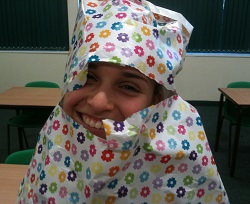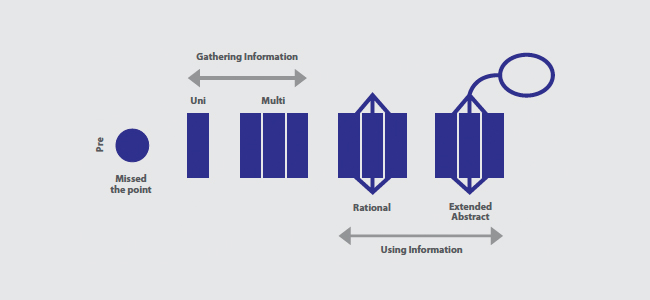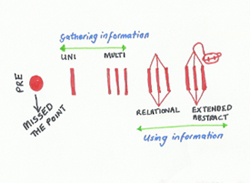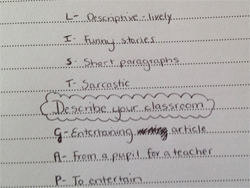We cover a lot of edtech trends, but which ones are here to stay the course? Iowa-based English teacher turned technology integration specialist Jarod Bormann gives his top five trends that are really leaving their mark in teaching.

If you are one with your ear to ground, I’m sure you have a pulse already on what is transforming instruction in education. As a classroom teacher, I thought I did too. But since changing my job to Instructional Technology, I have had the opportunity to work with educators in varying districts. I have also had the opportunity to expand my understanding by attending more tech conferences. These new experiences have given me a better outlook on what edtech trends are truly shaping education, whereas my prior knowledge mainly came from Twitter.
This time last year, I had a class full of high achievers that gobbled up literature for fun; however, the reality is, most classes are not like that. The pupils I teach do not choose my subject, it is mandatory and pupils often question its purpose. My current Year 11 class are your typical challenging, huffy, childish and loud learners who generally take their free education for granted, having known nothing else. I could spend the year complaining about them and use their typicality as a mid-set group as an excuse for average results.
SOLO evangelist Lisa Ashes has a new method for students to observe their progress in lessons. Using her Year 12 English class as an example, she asks 3 questions to each pupil, who after reviewing their answers, appreciate how deeper methods of exploration help them acquire a different perspective and achieve a higher level of understanding.

The way that I create a meta cognitive wrapper is by carefully creating three questions that will start and end my lesson; the questions link directly to my learning outcomes.
The first question is about the current knowledge and understanding of the student. The second should embody the type of SOLO thinking; research, analysis, evaluation and/or creation of new ideas.
My final question asks pupils to think about the processes they are about to undertake, to prove they have learnt something.
This article originally appeared in Innovate My School's September 2012 digital magazine.

The Structure of Observed Learning Outcome (SOLO) taxonomy aims to show pupils how to develop sophisticated responses to questions by getting them to examine their thought-process as their understanding of a topic improves. I began using SOLO in 2011, and it is now integral to my teaching.
SOLO defines five stages of understanding for any topic: prestructural, unistructural, multistructural, relational and extended abstract. The first three involve gathering relevant information. The other two are about using that information: linking facts and findings, questioning existing ideas about the topic, and forming new theories.
All well and good. But how does it work in practice? Here’s a simplified example of how SOLO can help a pupil with little knowledge of a topic develop a sophisticated understanding of it and see the thought-process that got him there. In our imaginary lesson, the goal is for pupils to write an essay exploring the choices Johnny Depp has made in his acting career.

I have it on good authority that autonomy is a problem when our sixth formers leave us for university life.
Helping pupils recognise their learning and find ways to enhance their own exploration of the world in which they live, encourages autonomy; this must be developed earlier if we want to avoid spoon-feeding GCSE students and sixth formers forever, damaging their chances when their apron strings are finally cut.
One of the reasons that I use SOLO is that it is an accessible way to get pupils to see and understand their own thinking. SOLO provides teachers and pupils with a clear path to higher order thinking.
Students are taught the features of each level and how each level leads to the next; with development, our students are able to use their understanding of their own thinking to forward their learning into synthesis.

There has been a recent twitter exploration on deep understanding led by Peter Skillen, of www.plpnetwork.com. The thrust of the debate centred on the ways in which we can support pupils move from 'novice' learning to 'expert' learning. Skillen paints a picture of the novice learner as one that is unable to plan, monitor and reflect on their learning.
With respect to metacognitive strengths, this might be the pupil that has poor procedural, declarative or conditional knowledge. If we look at this in terms of the way pupils interact with SOLO, then we may be looking at pupils who fail to go beyond the pre or unistructural stages. Alternatively the novice learner may equally describe a pupil who moves too quickly to the relational stage without the requisite uni and multistructural development.
Photo credit: estoril

Back in June I blogged about the collaboration between Physical Education educators world wide in the #PEBible and #GCSEPE Dropbox folders (#PEBible to #GCSEPE). In essence, teachers, researchers and coaches are sharing hundred of resources and lesson plans to share good practice and pedagogy with like minded individuals.
Since that post, a number of other shared Dropbox folders have been created that I am finding invaluable to support my teaching and development as a teacher.

As the end of this academic year draws ever nearer, our GCSE pupils may be in need of a little guidance in preparation for their forthcoming English exams. I can remember being unsure how best to revise for English when I was at school. It is not always as simple as learning facts and regurgitating them in order. Once you know that poem or that story, what do you do with that information? Once you have the names of all of the writing types and their language features under your belt, what do you do with them? Having spent the last year teaching pupils how to use SOLO effectively, I am now using SOLO as a tool to help them revise. I will share as many ideas as possible over the next few days including: reading, writing, contemporary texts, poetry and finally some in class, last minute revision ideas. I hope you find it useful.

A community-driven platform for showcasing the latest innovations and voices in schools
Pioneer House
North Road
Ellesmere Port
CH65 1AD
United Kingdom